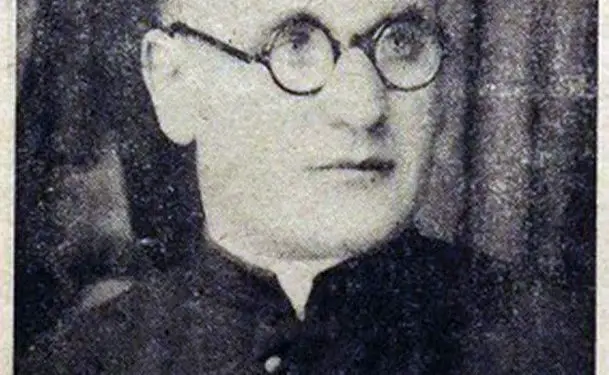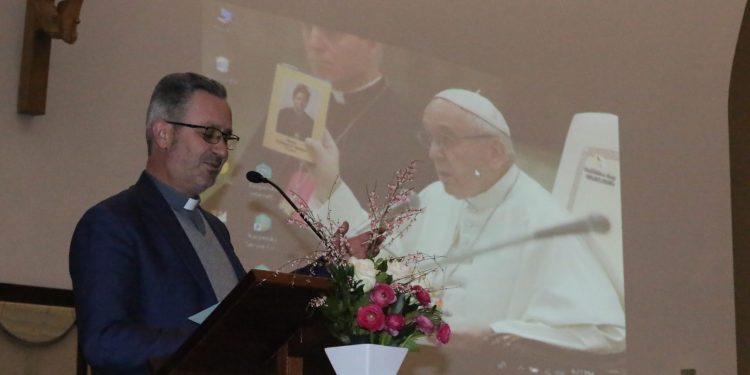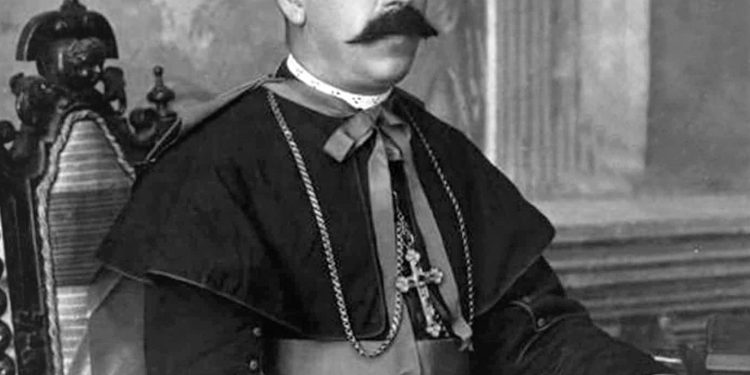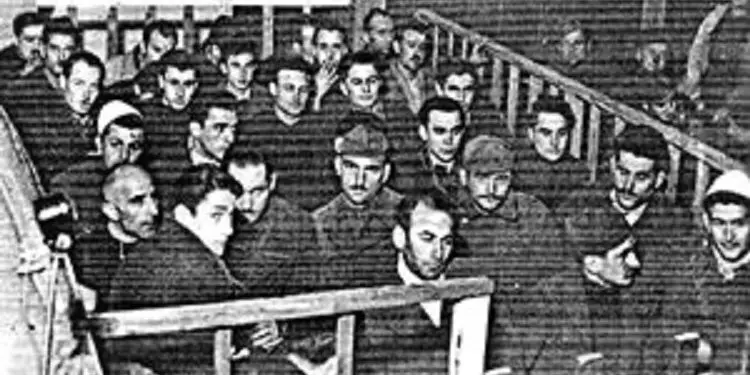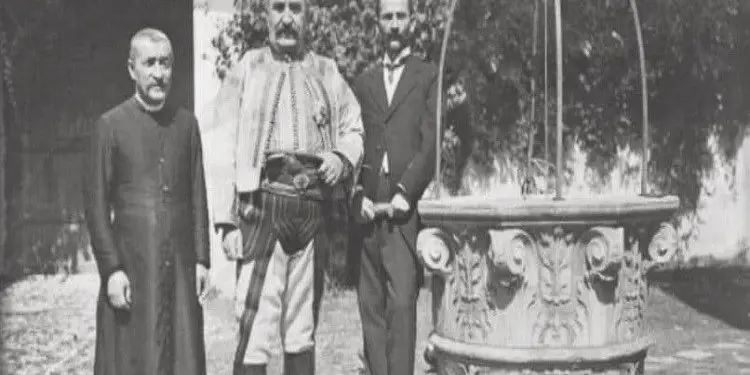By Dom Marjan Lumçi
– Monsignor Thaçi, refused to meet Mehmet Shehu in Shkodra Cathedral and refused Enver Hoxha’s request to break away from the Vatican-
Memorie.al / Monsignor Gaspër Thaçi was born in Shkodër on January 23, 1889, in the famous Shkodra family of the Thaçi. May 26 is the anniversary of the death of the Archbishop of Shkodra, Monsignor Gaspër Thaçi, who passed away in 1946. A great national and ecclesiastical figure, Monsignor Gaspër Thaçi, who was a true spiritual shepherd, protector and cultivator of national and ecclesiastical values, cultural and spiritual. Fearless witness of the religion in Christ and defender of the truth. He stood out for his extraordinary courage when he had to defend the Gospel and the flock that was entrusted to him. And this, in difficult times, when the Albanian Church, with the heavy cross on its shoulders, was climbing, cursed, spit on, bloodied, to the top of Golgotha. He never became a tool of any policy: he remained a pure patriot, an ardent preacher of the Good News
With the death of Monsignor Lazër Mjedja, Archbishop of Shkodra, his place was taken on March 19, 1936 by Monsignor Gaspër Thaçi, who was born in Shkodra on January 23, 1889, in the famous Shkodra family of the Thaçes.
Monsignor Thaçi completed his primary education in the church schools of his hometown, in Shkodër, and then, like most other Albanian clerics, he continued his theological and philosophical studies in Innsbruck, Austria.
He led the first Mass on November 21, 1911 and immediately began serving as a parish priest in the diocese of Sapa in Nënshat, Dajç and Qelëz in Puka, where on December 8, 1912, he also raised the Albanian flag.
Under his direction, many very important doctrinal and social conferences were organized, which aimed to prepare Catholic believers for the approaching times under the communist dictatorship.
Monsignor Gaspër Thaçi, never became a tool of any politics: he remained a pure patriot, an ardent preacher of the Good News, an outstanding orator, a man who did not know how to twist his words, a pure soul, a true priest of Christ. That’s why he attracted the believers so strongly, who looked at him, the man who lived as he preached.
Monsignor Thaçi was the organizer of the committee for the celebration of the jubilee celebrations of Saint Louis and Saint Louis, as well as the 700th anniversary of the birth of Saint Francis, events to which the press of that time paid special attention.
As a prominent clergyman and patriot when he was a parish priest in the diocese of Sapa, the deep mountainous Qelza, he would raise the flag of Albania on December 8, 1912. After the illness of Monsignor Lazër Mjedë, on 19.III.1936, together with Monsignor Vinçenc Prennushin , O.F.M. is consecrated Archbishop of Shkodra and Metropolitan of Albania, by the Apostolic Delegate, Monsignor Gjon Della Pietra, in the Cathedral.
He is the Vicar General of the Archdiocese of Shkodra and its parish priest, which at that time had nearly 15,000 Catholics and nearly 50 priests (a rare case compared to any other city). With this function, Monsignor Thaçi served from 1936, until his death, at the end of 1946, in Shkodër.
As Archbishop, he helps in the construction of churches including the one of Bërdica, the church of Rus, the Chapel of the Cemetery of Rrmaji, he ordains the elder of Shna Ndou in the Franciscan Church, he helps in the publication of magazines, such as; “Sunday Bell”, etc. He leaves the best impressions on the local and foreign authorities who meet with him.
Major General Mehmet Shehu was not welcomed when he came to visit the Archbishop’s Palace on Easter, a week after the shooting of Dom Ndre Zadeja.
Fierce defender of the Religion and its ideals, politician and diplomat in the difficult conditions he lived in, he always excelled for the benefit of the Religion and the nation. He was the Archbishop of Shkodra and the primate of the Catholic Church, when the communists took power in Tirana. Together with Monsignor Prennushin, he was called by Prime Minister Enver Hoxha, who proposed to them to sever relations with the Vatican and Rome, but they categorically refused.
They are placed in a residence under control, and in conditions of isolation, to say house arrest for them, helplessly assist the arrest of priests, the execution and elimination of religious orders, for the meetings that were held and directed by Him. But being distorted and dressed in communist infidelities. They knew he was sick, and yet the police came every day to question him or stopped by his office.
The pressure and horrific events of the period, the threat and the shootings of his colleagues, Dom Lazer Shantoja, Dom Ndre Zadeja, Father Anton Harapi and, above all, the mass shootings of March 4, 1946, with Father Gjon Shllaku, Father Xhovani Faustin, Father Danjel Dajanin and how many other civilians became the cause of the immediate worsening of his condition and his death.
The Archbishop of Shkodra, Monsignor Gaspër Thaçi, died after a strict surveillance, on May 26, 1946, in those conditions of horror and terror that the city of Shkodra and especially the Albanian Catholic Clergy lived in, as he also suffered from diabetes.
A funeral was held in the city and, when the procession was returning near the Cathedral, that incident, which we all already know, happened. A truck had taken the road in the middle, we put them on purpose. Then young men, strong men, avoid the truck to make way for the funeral.
At the state high school, the principal forbade students to attend the funeral, but it was impossible to stop. That courageous funeral is held by the youth, throughout the city of Shkodra, which will later become the reason for the imprisonment, torture and punishment of several clergymen and other citizens. That’s why we rated it as; “the funeral that brought so many victims”!
It was only a funeral, but it had a great significance…er, an even greater punishment. Through that funeral, Shkodra wanted to tell the dictatorship that: “He didn’t like communism, he didn’t like the dictatorship and its atheism”, while the other side would tell Shkodra that that opinion, that attitude, in the dictatorship of the proletariat, there would be a severe punishment.
The victims of that funeral cannot be counted, how many were imprisoned, how many were martyred and shot, how many were killed at the border during the escape and, among the cells of the Security during their massacre, how many young people and high school students but also how many clergy and even old people , like the first Albanian novelist, Dom Ndoc Nikaj, who at that time was no less than 80 years old and “walked” the streets of Shkodra with a gun in his arm to discredit him!
The victims of that funeral cannot be counted, how many were imprisoned, how many were martyred and shot, how many were killed at the border during the escape and, among the cells of the Security during their massacre, how many young people and high school students but also how many clergy and even old people , like the first Albanian novelist Dom Ndoc Nikaj, who at that time was no less than 80 years old and “walked” the streets of Shkodra with a gun in his arm for discredit…!
The Archbishop of Shkodra, Venerable Gaspër Thaçi, is buried in the Cathedral of Shkodra and his remains remain there until March 1967, when, returning to the Sports Palace, they would be dissolved, without you even knowing today, their place. Memorie.al




